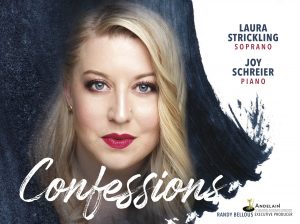By Mikeila McQueston, special to the Sybaritic Singer
Both well-curated and well-crafted, soprano Laura Strickling and pianist Joy Schreier’s collaborative album Confessions celebrates contemporary art song. The album was released in the fall of 2020 by Yarlung Records and features compositions by Clarice Assad, Tom Cipullo, Michael Djupstrom, Amy Beth Kirsten, Libby Larsen, and Gilda Lyons. The title Confessions, borrowed from Assad’s song cycle of the same name, reflects Strickling’s desire to bring audiences and musicians closer together through meaningful, communicative performances. Fortunately for us, Strickling and Schreier deliver. The result is an engaging, kaleidoscopic narrative which is at times fiercely determined, bright and witty, and achingly vulnerable.
Technical skill and emotional contrast are among the album’s most notable strengths. Together, Laura Strickling and Joy Schreier are a tour de force. Schreier expertly navigates a multitude of styles through carefully nuanced dynamics, phrasing, and articulations. Strickling’s diction is clear and crisp. Though she indulges in Sprechstimme, straight tone, slides, and other stylistic choices, Strickling is careful never to overuse effects, allowing them to dramatize without detracting from her beautiful and seemingly effortless vocal tone.
The descending pitch slide on the word “noble” seems to contain an entire backstory in itself, a tragic fall conveyed in a single lyric
Performers often find their strengths lie skewed towards either the comedic or the dramatic. Therefore, it was a delight to bear witness to both in the album Confessions. In particular, Assad’s “Fixation” from her song cycle Confessions and Cipullo’s “The Pocketbook” from How to Get Heat Without Fire had me in fits of giggles. Strickling and Schreier’s rendition of Fixation drips with comedic melodrama and is as deliciously indulgent as its subject matter (dessert!). Their delivery of The Pocketbook’s reductio ad absurdum logic is utterly convincing, and I relished small details in the piano part, including a brief musical quotation of Mendelssohn’s Wedding March as the protagonist too-eagerly considers selling her wedding ring to pay for a luxury handbag. Best of all was a moment of vocal duet, featuring a brief but taunting line sung by Schreier. I mean, how often do you get to hear the pianist sing alongside the vocalist in a typical art song recital?

Lyons’ Songs of Lament and Praise offers contrast in terms of both mood and poetic material, as the poems used by Lyons were all written prior to the 13th century. The first piece, Eve’s Lament begins with a haunting, unaccompanied melody, then flows attaca into Deirdre’s Lament, which was perhaps my favorite piece of the whole recording. Strickling’s honest delivery of the folk-like melody combined with the delicate ostinato accompaniment touched me deeply. The descending pitch slide on the word “noble” seems to contain an entire backstory in itself, a tragic fall conveyed in a single lyric. The two segments of the cycle devoted to praise, Hymn To The Archangel Michael and An Even-Song, are contemplative, exuding a quiet confidence rather than ostentatious worship.
The drama of the flautist’s tongue trill evokes a wicked curveball whizzing past one’s ear
Other examples of contrast continue in the remaining selections, though the gravitas becomes more prominent overall. Amy Beth Kirsten’s To See What I See utilizes Ophelia’s monologue from Shakespeare’s Hamlet. Here, one does not witness the gradual unraveling of Ophelia’s mental state, but rather enters immediately into a dark uneasiness, proclaimed by vocal sighs and punchy chords in piano. An antithesis in fluidity, Djupstrom’s I Would Live in You from Three Teasdale Songs flows freely to depict coastal imagery and the naturalness of falling in love. The remaining two Teasdale songs use a similar sonic palette.
The last piece included on the album is Libby Larsen’s Righty, 1966. In this composition, which also features flautist Sarah Eckman McIver, the protagonist recounts her tom-boyish qualities, particularly her pitching skills, at age 12. Again, Strickling embodies the protagonist completely, and the flute seems to take on the character of the baseball itself. Larsen uses the drama of the flautist’s tongue trill to evoke a wicked curveball whizzing past one’s ear. The ending is abrupt, but charming: a soft staccato chord meant to imitate a winking gesture.
Overall, listening to Confessions was a cathartic experience, a study of musical contrasts bound by the threads of universally experienced thought, emotion, and memory. Alongside the composers of these works, Laura Strickling and Joy Schreier pay tribute to the genre of art song by creating moments of nostalgia, self-indulgence, doubt, loss, and love in this 60-minute album.

Mikeila McQueston is a composer and soprano based in Peachtree City, Georgia. In addition to receiving commissions from groups such as Coro Vocati and Invicta Trio, Mikeila’s accomplishments include being selected as a Presser Scholar and a winner of the LSU Symphonic Winds Call for Scores and the Constantinides New Music Ensemble Call for Scores. Mikeila received her BM from Louisiana State University and is currently pursuing a double MM in Composition and Vocal Performance at the University of Tennessee. In her free time, Mikeila enjoys playing the harp.
